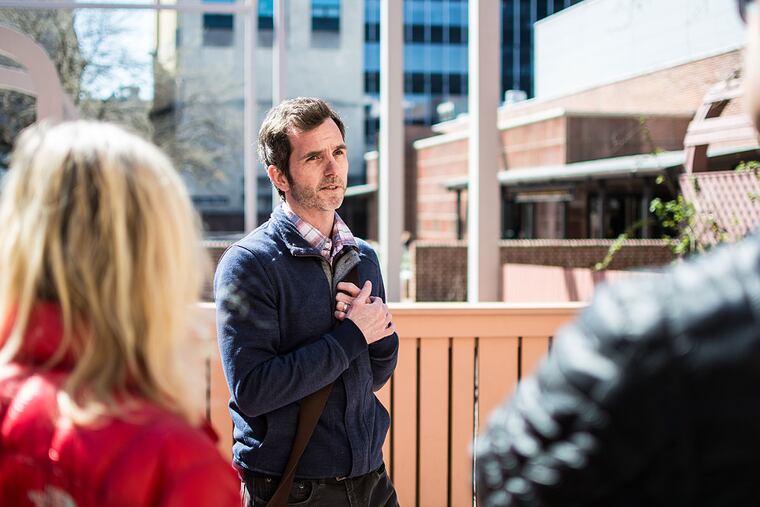The story of our city from a tour guide's view
I wanted my pin. The glorious white-and-gold pin that would make me - a humble, transplanted son of Brooklyn - a real-deal, certified Philadelphia tour guide.

I wanted my pin.
The glorious white-and-gold pin that would make me - a humble, transplanted son of Brooklyn - a real-deal, certified Philadelphia tour guide.
I feel a kinship with our city's guides. I tell stories of a city. They tell the story of a city.
City guides have worked hard to restore their reputations after some of their less-informed colleagues were shamed for spewing bad history a few years back. I wanted to give them credit.
Plus, I'm a history nerd. I thought the pin would look cool.
Now it was test day.
Study questions caromed around my head.
The only remaining Colonial-era tavern? Easy. Man Full of Trouble at Front and Spruce.
Tallest Philly building until 1856? Boom. Christ Church with its tower.
Whose nose is 18 inches long? Shoot, whose nose was 18 inches long, again?
***
The man to see about becoming a tour guide in Philly is Bob Skiba, a founding member of the Association of Philadelphia Tour Guides.
For Skiba, the lure of tour guiding is simple: It's walking the streets and having the ghosts come alive.
"It's the stories," he said.
But back in 2008, some Philly guides and carriage drivers were getting the stories all wrong, telling wild tales of how Washington and Lincoln were known to dine at the City Tavern, together. And how our beloved Ben Franklin had 69 illegitimate children.
In response, City Council voted to require tour guides to pass tests. A handful of guides sued, charging infringement on their right to free - if wildly incorrect - speech. The economy tanked and the ordinance floundered, never to be enforced.
Skiba and other proud Philly guides stepped into the void. They compiled a 254-page handbook and began a historical lecture series. They drew up a test for guides and even developed a master guide program.
They've certified about 180 guides, says Skiba, plus two master guides. (The National Park Service rangers who provide tours of Independence Hall and other historic city buildings have their own training.)
Certification is voluntary. And Skiba, a blogger and historian who has been giving city tours for 17 years, still hears guides - noncertified ones, he assures - say things that make him cringe. With Philly increasingly in the spotlight, his group is doing all it can to make sure our history-tellers are telling it straight.
Of his students, he said: "I like to think they have a certain amount of pride and professionalism."
***
We started with etiquette class.
Seven of us squeezed onto couches in the lobby of the Courtyard Marriott one Saturday in early March, after a broken, blaring alarm system chased us from our City Hall classroom.
Skiba led us through some practical pointers, but also offered deeper ruminations on Philly guiding.
How we shouldn't try to compete with horses; they will drown us out every time.
How there will be a know-it-all in every group. Count on it.
How if we're not funny, don't tell jokes.
How we must be able to relate the past to the present - how that's what matters most. How we must be able to tell the bigger story of our city, of where we were, where we are, and where we're going.
How if we can't do that, "there's no point in talking about it."
Next came our practice tours.
John David Flower, who is 41 and recently moved from Portland, Ore., to East Passyunk, went first. He explained the history of the Free Quaker Meeting House, doing wonderfully except for making the new-to-town mistake of calling Fifth Street - alas! - Fifth Avenue.
Lou Ann Di Nallo, a librarian from Doylestown, overcame the sounds of a horse's clip-clops on cobblestone to tell in fine detail about the American Philosophical Society.
Kim DiBenedetto, 56, who works as a docent at a historical mansion in Fairmount Park, spoke at the Todd House, telling of the day in 1794 when the ill-fated Vice President Aaron Burr introduced a widow named Dolley to her future husband, James Madison.
I gave a tour of Franklin Court, where Benjamin Franklin's home once stood. The lines that seemed so smooth in practice in front of my bathroom mirror a few hours earlier now felt jumbled.
My classmates offered kind critiques.
Skiba told us we'd all get better.
I recovered on test day.
The statue of William Penn has an 18-inch nose, I remembered, making my way through the 120-question test.
I walked home proud, my pin in my pocket, feeling as if I had a much better understanding of the story of our city.
215-854-2759